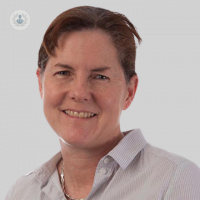Breast pain: When should I see a specialist?
Written in association with:Although breast pain is rarely a sign of something serious, recurrent symptoms can be a cause for concern, as well as a source of discomfort. In this informative article, we hear from highly esteemed consultant general surgeon and breast specialist Miss Emma Gray on the most common causes of breast pain, how to find relief at home and when to see a specialist.

What can cause breast pain?
Breast pain, or mastalgia, is very common and can be caused by various factors. Hormonal changes are the number one reason women have breast pain. Breasts become sore three to five days prior to the beginning of a menstrual period and stop hurting after it starts. This is due to a rise in oestrogen and progesterone right before your period.
Other possible causes of breast pain include an incorrect bra fit, infections, cervical root disorders, injuries or sprains to the neck, shoulder or back. Some medicines including the contraceptive pill and some antidepressants can also cause breast pain. Conditions like mastitis or a breast abscess, can also be responsible. In addition to pregnancy, hormone changes during the menopause may also lead to breast pain.
If you are experiencing breast pain that is severe or lasts longer than two weeks, you should see your doctor.
How can I relieve breast pain at home?
There are several ways to help relieve breast pain, including:
- using an anti-inflammatory or analgesic gel
- using an ice pack or a hot compress
- adopting proper sleeping positions that cause less strain on the breast
- learning what triggers breast pain so you can avoid the problem
- resting from straining activities
You can also try taking a warm shower or bath which will relax you and can help relieve breast pain. You could also try filling a hot water bottle or get a heating pad and place it on your breasts. Over-the-counter heat rubs may also help alleviate tenderness, though you should be careful putting these creams on your nipples. You should also avoid using creams of this type if you are breastfeeding.
Can breast pain be a sign of something serious?
Breast pain is not typically a sign of breast cancer. In fact, one study found that only six per cent of women reported breast pain as their main symptom.
A breast tumour is a hard clump of breast cancer cells that causes a lump in the breast. However, if you experience persistent, unexplained breast pain or other symptoms such as signs of a breast infection, including local redness, pus, or fever; redness of the skin of the breast that may appear as a rash, with dilated pores, and possibly skin thickening, you should see your doctor.
If you have concerns about your breast pain or any other symptoms you are experiencing, I encourage you to see your doctor.
How is the cause of breast pain diagnosed?
The diagnosis of breast pain depends on the underlying cause of the pain. A mammogram is usually the go-to tool when it comes to diagnosing breast pain and other issues, but ultrasound imaging is sometimes more accurate in people under thirty years old. Mammograms, however, are highly accurate at detecting cancer, especially in older adults.
If a woman is pre-menopausal, the doctor will try to determine whether the breast pain might be cyclical. If you’re experiencing any of the following symptoms, it’s important to schedule an appointment with a doctor for an evaluation and diagnosis:
- discharge from your nipples
- sudden increases in pain or pain changes
- a painful lump or mass
- discoloration or skin changes
- pain in one specific area pain not related to your menstrual cycle
If you concerned about breast pain and would like to schedule a consultation with Miss Gray, you can do so by visiting her Top Doctors profile.


